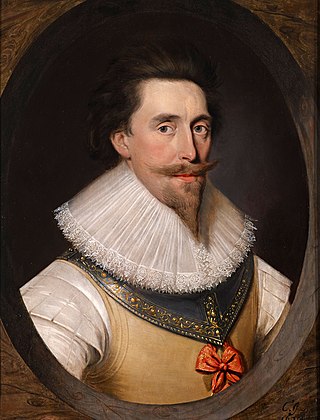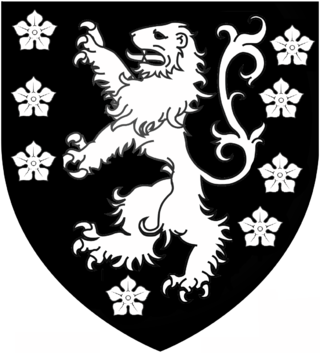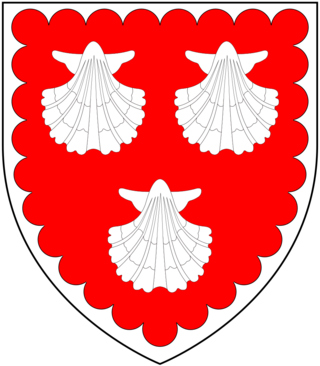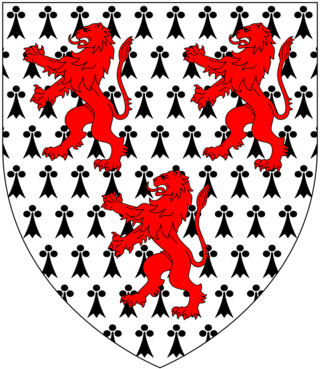Related Research Articles
Richard Newport, 1st Baron Newport was an English landowner and politician who sat in the House of Commons at various times between 1614 and 1629. He supported the Royalist cause in the English Civil War and was created Baron Newport in 1642.

Francis Fane, 1st Earl of Westmorland, of Mereworth in Kent and of Apethorpe in Northamptonshire was an English landowner and politician who sat in the House of Commons between 1601 and 1624 and then was raised to the Peerage as Earl of Westmorland.
Sir William Armine, 1st Baronet was an English politician who sat in the House of Commons at various times between 1621 and 1651. He supported the Parliamentary cause in the English Civil War.

John Crew, 1st Baron Crew of Stene was an English lawyer and politician, who sat in the House of Commons at various times between 1624 and 1660. He was a Puritan and sided with the Parliamentary cause during the Civil War. He was raised to a peerage as Baron Crew by Charles II after the Restoration.

Sir Gervase Clifton, 1st Baronet, K.B. was an English politician who sat in the House of Commons at various times between 1614 and 1666. He supported the Royalist cause in the English Civil War. He was educated at St John's College, Cambridge.

Sir Edward Seymour, 2nd Baronet was an English landowner and politician who sat in the House of Commons between 1601 and 1625. He was an ambassador to Denmark. During the English Civil War, he supported the Royalist cause.
Sir John Wray, 2nd Baronet was an English politician who sat in the House of Commons at various times between 1614 and 1648. He supported the Parliamentary cause in the English Civil War.
Sir Christopher Wray was an English politician who sat in the House of Commons at various times between 1614 and 1646. He supported the Parliamentary cause in the English Civil War.

Sir Walter Erle or Earle was an English landowner and politician who sat in the House of Commons at various times between 1614 and 1648. He was a vigorous opponent of King Charles I in the Parliamentary cause both before and during the English Civil War.

Charles Trevanion, c. 1594 to c. 1660, was an English landowner and politician, who was MP for Cornwall in 1625 and Sheriff from 1633 to 1634. He supported the Royalist cause during the First English Civil War, his eldest son John Trevanion being killed in 1643.
Sir Robert Crane, 1st Baronet of Chilton, Suffolk and of Buckenham Tofts, Norfolk, was an English politician who sat in the House of Commons variously between 1614 and 1643.
Sir William Lytton DL JP was an English politician who sat in the House of Commons from 1640 to 1648. He supported the Parliamentary cause in the English Civil War.
Sir Neville Poole was an English politician who sat in the House of Commons variously between 1614 and 1648. He supported the Parliamentarian side in the English Civil War.
Sir Henry Compton KB was an English politician who sat in the House of Commons at various times between 1601 and 1640.
Sir Henry Anderson (1582–1659) was an English Royalist landowner and politician who represented Newcastle-upon-Tyne once as Mayor and twice as MP in the House of Commons between 1614 and 1643 and was also High Sheriff of Northumberland.
Sir John Leigh (1598–1666) was an English politician who sat in the House of Commons at various times between 1640 and 1660.

Henry Henley (1612–1696) was an English politician who sat in the House of Commons at various times between 1653 and 1681. He supported the Parliamentary cause in the English Civil War.
John Hale (1614–1691) was an English politician who sat in the House of Commons between 1654 and 1660. He fought in the Parliamentary army in the English Civil War.

Sir George Chudleigh, 1st Baronet, of Ashton, Devon, was an English landowner and politician, who sat in the House of Commons at various times between 1601 and 1625. He had close family connections to a group of Devon Presbyterians, including Sir William Strode.
Thomas Colepeper, was an English Member of Parliament.
References
- 1 2 3 4 5 W R Williams The Parliamentary History of the County of Oxford
- ↑ Willis, Browne (1750). Notitia Parliamentaria, Part II: A Series or Lists of the Representatives in the several Parliaments held from the Reformation 1541, to the Restoration 1660 ... London. pp. 166–239.
- ↑ The parliamentary or constitutional history of England;: being a faithful account of all the most remarkable transactions in Parliament, from the earliest times. Collected from the journals of both Houses, the records, ..., Volume 9